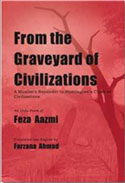"This is the destination. Man's desired goal. This is Paradise promised on earth for every soul."

 |
From the Graveyard of Civilizations:
A Muslim’s Rejoinder to Huntington's Clash of Civilizations by Feza Aazmi (translated by Farzana Ahmad) Trafford Publishing
book review by Mihir Shah
The powerful spirit of the original verse and its thought provoking message to the western world is not lost in translation. In fact, the translator eloquently depicts the depravity and greed that has consumed the world's civilizations. More importantly, the compilation, using history as reference, hints that an unwelcoming fate for these civilizations is imminent if the focus remains on world hegemony and a desire for power and authority.
The opening chapter, "In The Necropolis of Civilization," is particularly interesting: The speaker paints a harrowing, yet accurate portrait of dynastic civilizations slain by greed, selfishness, and deceit. From the powerful Greeks and Romans to the potent Chinese dynasties and intimidating pharaohs of Egypt, these once dominant civilizations have withered away, and all their glory gone. The poetry states that Western culture, like bygone nations, is in jeopardy of eventually falling from glory; in order to rule forever, they must possess "power absolute to rule the world."
"The Inevitable Hour Awaits" reveals a haunting image of a 21st century battlefield that encompasses most of the world and is referenced as potentially the last in the world's history. Interestingly, the collection of chapter-length poems points out that the rise to power of the Western civilization, with its Christian identity, is tainted with the blood of the innocent, be it the atomic bomb in Hiroshima or the merciless destruction of innocent civilians in Vietnam and Afghanistan.
Civilizations, the author suggests, do not perish in violent clashes, but deteriorate through social and moral stagnation. In order to create a peaceful world, civilizations must profess boundless love and friendship and "approve not hatred, plunder and dismemberment, condone not oppression or aggression."
While the translation doesn't use any traditional poetic schemes and is mainly free verse, there are numerous stunning visuals that help readers understand the message. Audiences will find the historical references enlightening and the overall purpose meaningful to humanity.